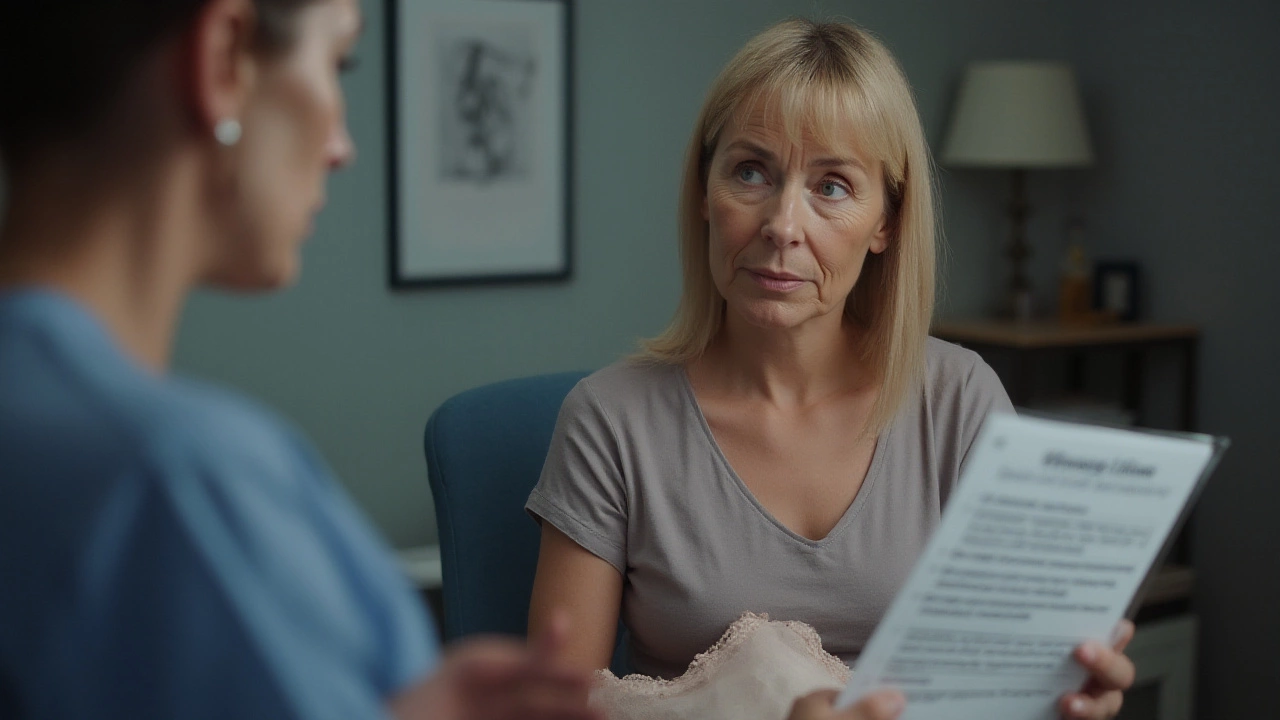 Aug, 2 2025
Aug, 2 2025
Picture this—you’re standing in a chilly hospital gown, clutching your clothes, as a nurse asks if you’re good to go. Your mind races with worries about fasting, the anaesthesia, and that burning little question: can you actually wear a bra during surgery in the UK? It feels weirdly personal and almost trivial until you’re actually there. Here’s the odd thing. In 2025, people in the UK still Google this non-stop, and hospitals get asked every single day. So, what’s the real answer, and what should you expect if you’re headed for an operation? Let’s take a deep dive into what actually happens before you head into theatre, and why something as basic as your underwear really matters.
Hospital Protocols: What the Rules Actually Say
As far as official NHS and private hospital guidelines go, the basic rule is: patients are almost always asked to remove their bras before surgery. The big reason? Metal parts like hooks, underwires, or fastenings can mess with equipment in the operating room. For example, the use of something called diathermy (an electrical surgical tool) means even a tiny bit of metal can lead to skin burns or inaccurate monitoring. It’s not about modesty—it’s about safety.
But why do people still want to wear a bra during surgery? Some patients are worried about discomfort, especially if they have larger breasts, a recent injury, or recent surgery (like a mastectomy or breast augmentation). Others feel exposed and more anxious without one. Let’s make it clear here: in most hospitals, standard protocol bans all underwear including bras, unless staff say otherwise. In rare medical scenarios, you might be allowed to keep a soft, non-wired, surgical bra on if it’s medically necessary or part of your treatment (think: certain breast surgeries).
Take a look at these examples of policy language found in actual UK hospital pre-surgery leaflets:
- “Please do not wear underwear or bras for your operation. You will be provided with a gown.”
- “Remove all items with metal prior to coming to theatre.”
- “Patients undergoing some types of breast surgery may wear approved, surgical, non-wired support bras if advised by their surgeon.”
If you’re having day surgery, it can feel unsettling to hang out in a backless gown. Most hospitals have a disposable paper gown underneath and sometimes paper knickers for extra comfort—but if you’re prepping at home, don’t assume you’ll be able to keep on any regular underwear, including your bra.
Let’s break down some numbers to bring this home. According to NHS Digital’s latest reports, UK hospitals performed more than 3 million surgical procedures just last year. Out of those, less than 0.5% of patients were allowed any kind of undergarment in theatre, and usually only after discussion with staff. Here’s a quick look at the stats:
| Total Surgical Procedures (UK, 2024) | Patients Allowed Any Undergarment | Patients Allowed a Bra (Medical Reasons) |
|---|---|---|
| 3,019,042 | 14,800 (0.5%) | 6,200 (0.2%) |
Special Circumstances: When a Bra Might Be Allowed
So when does a hospital break the standard rule? Mainly for two reasons: medical need or psychological comfort in exceptional situations. Most often, this comes up after breast surgeries. Certain post-surgery bras, prescribed by the surgeon, help support healing tissues and reduce swelling, and skipping them could actually put recovery at risk.
For example, if you’ve had breast reconstruction, reduction, or implant surgery, your care team might instruct you to wear a specific, compression-style bra, usually without metal (no hooks, no wires) and made of soft, breathable fabric. In some private clinics, they’ll provide the bra themselves—often logistically matching surgery to after-care garments, so patients don’t have to guess.
But let’s get real: even in these cases, you can’t show up on surgery day with a random sports bra from your drawer. It has to meet the strict criteria set by your medical team. It’s more common in the private sector or in specialist units, but sometimes NHS hospitals make exceptions if you explain your situation in advance.
Here’s what matters:
- Zero metal parts—this is non-negotiable, since even tiny bits can be dangerous in the operating room.
- It needs to fit snugly, without causing pressure on surgery sites.
- The surgical team must agree it’s safe and necessary.
Believe it or not, some hospitals have started offering single-use, paper or mesh bras for certain procedures, but these are more about modesty and support for specific groups—again, only if the care team agrees it's medically safe. Even if you’re anxious or shy, the default answer is still 'no bra in theatre' unless you’re told otherwise.
If you’re feeling super nervous about being without a bra, the best thing you can do is talk with your nurse or surgeon at your pre-op appointment. They might not have total flexibility, but if modesty and body image are triggering issues for you, open up about it. Hospitals are used to these concerns, especially with patients who have a history of trauma or who are neurodivergent.
You might be able to keep your bra on right up until you’re being wheeled down to theatre, then hand it over to a nurse who will keep it safe until you’re ready to get dressed again. But don’t expect to negotiate at the last minute—it’s not safe for anyone to make a sudden call in the anaesthetic room.

What to Expect on Surgery Day
So what does it feel like on the day? After you check in, hospital staff will go through a detailed checklist. This usually includes:
- Removing all jewellery, watches, and metal hair clips
- Changing into a hospital gown (sometimes with paper underwear provided)
- Removing glasses, dentures, and yes, your bra
- Storing everything securely in a named bag to collect after surgery
The theatres are kept very clean and cool for infection control—that’s why those gowns always feel a bit icy. If you’re worried about feeling cold or exposed, hospitals often have extra blankets or ‘modesty’ sheets. Staff know that dignity matters. They’re trained to cover you up as much as possible, and to keep private areas shielded during prep and while you’re coming round from the anaesthetic.
If you have a post-surgery bra recommended by your consultant, a nurse will help you into it as soon as it’s safe, usually once you’re back in recovery. You’re also less likely to be able to wear pants, underwear, or vests of any sort. This is all part of reducing any fire or burn risk from surgical tools, preventing infections from outside materials, and ensuring medical staff can access all the right areas quickly if anything unexpected comes up.
One tip worth knowing: it helps to bring a soft, comfortable front-opening top or loose baggy shirt to wear after your op. You’ll want something super easy to slip on, especially if you’re groggy or sore.
And don’t expect to be alone in any of these worries. A 2024 survey by UK charity “Hospital Buddy” showed that 62% of patients said “being in just a gown” was the single most intimidating part of their surgery day—beating out fears about pain, anaesthesia, and even needles!
Tips for Preparing and Dealing with Body Anxiety
No matter your size or surgery style, the idea of being undressed in front of strangers can stir up real stress. This isn’t just vanity—it’s about vulnerability. Hospital staff are so used to this, they’re generally pretty discreet and supportive. But there are ways to feel a bit more in control:
- Ask questions early – Don’t leave it for the day. Some exceptions can only be arranged in advance, especially if you think a surgical support bra is medically needed.
- Choose loose, dark, comfortable clothes for after surgery, including socks and a big sweater—makes the return to the ward less awkward.
- If you're getting local anaesthetic and staying awake, ask if you can keep your bra on until you get to the anaesthesia room. Some staff are flexible up to a point, but only if you prep them in advance.
- People recovering from trauma, or those with sensory issues, can flag this with their care team. Hospitals have sensitive procedures for anyone with a medical or psychological reason for extra cover.
- Want extra dignity? Consider a button-down shirt or a light scarf to wear after surgery, or to put on as soon as the procedure is done. Hospitals can be drafty and bright, so a layer you can drape works wonders for comfort.
- Bring your own surgical or sports bra for after surgery if a nurse or consultant says you can. But don’t assume it will be allowed in theatre—ask first.
- If you have concerns about body image or shame, let a nurse know privately. They deal with this way more than you’d think; you won’t be the first or the last.
- To avoid surprises, double-check the policy when you come for your pre-op visit. Written policies can seem harsh in black-and-white but staff often talk things through on a case-by-case basis.
It’s never silly or vain to want to feel OK about your body on surgery day. Most hospitals are way more attuned to these issues than they were a decade ago, and that change came from patients speaking up. If you’re anxious about the rules, raise your hand—someone will have an answer or at least make the day a little easier.
Bra during surgery UK isn’t just a search phrase—it’s a real-life moment where a small thing can feel huge. And every year, more patients and hospitals are working together to make the answers feel as human as possible.
